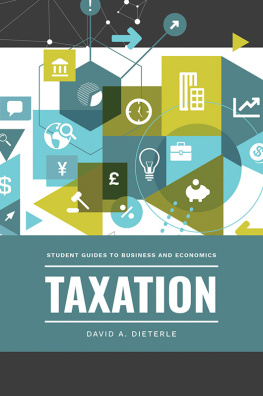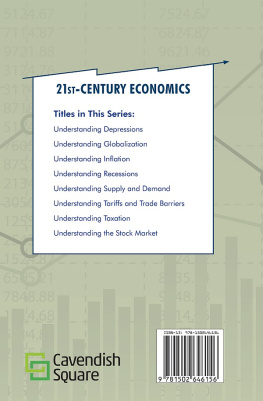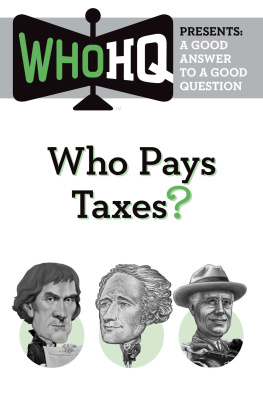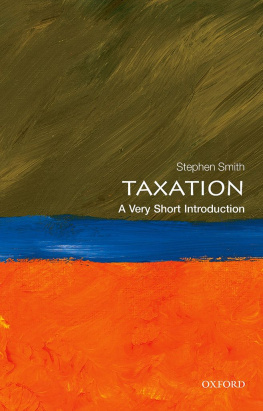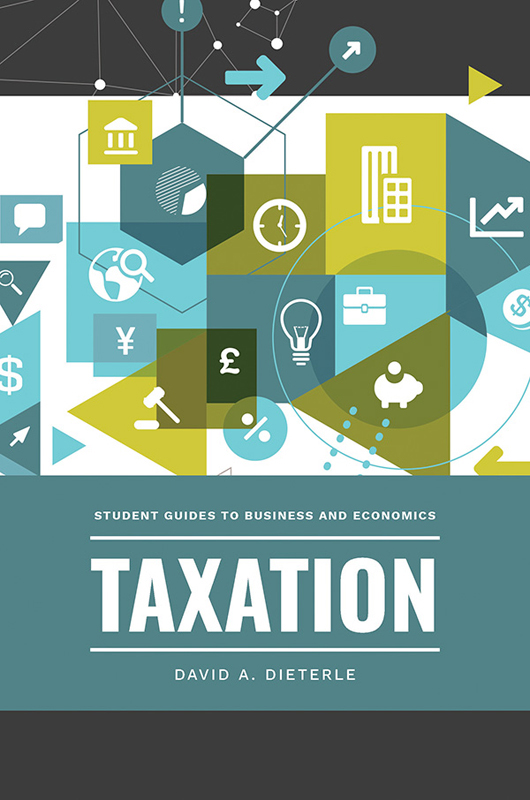Taxation
Copyright 2020 by ABC-CLIO, LLC
All rights reserved. No part of this publication may be reproduced, stored in a retrieval system, or transmitted, in any form or by any means, electronic, mechanical, photocopying, recording, or otherwise, except for the inclusion of brief quotations in a review, without prior permission in writing from the publisher.
Library of Congress Cataloging-in-Publication Data
Names: Dieterle, David Anthony, author.
Title: Taxation / David A. Dieterle.
Description: Santa Barbara, California : Greenwood, an imprint of ABC-CLIO, LLC, [2020] | Series: Student guides to business and economics | Includes bibliographical references and index.
Identifiers: LCCN 2019029429 (print) | LCCN 2019029430 (ebook) | ISBN 9781440869938 (print) | ISBN 9781440869945 (ebook)
Subjects: LCSH: TaxationUnited States. | TaxationHistory.
Classification: LCC HJ2362 .D54 2020 (print) | LCC HJ2362 (ebook) | DDC 336.200973dc23
LC record available at https://lccn.loc.gov/2019029429
LC ebook record available at https://lccn.loc.gov/2019029430
ISBN: 978-1-4408-6993-8 (print)
978-1-4408-6994-5 (ebook)
242322212012345
This book is also available as an eBook.
Greenwood
An Imprint of ABC-CLIO, LLC
ABC-CLIO, LLC
147 Castilian Drive
Santa Barbara, California 93117
www.abc-clio.com
This book is printed on acid-free paper 
Manufactured in the United States of America
For all taxpayers, young and old,
May we all be more economically educated citizens.
Contents
In the song Taxman, the Beatles tell us that anything can be taxed. Politicians are proving them correct, as we will see in our journey. Ben Franklin compared taxes to death. Nations have been born over taxation, as the battle cry, No taxation without representation rang out across a collection of colonies. President Reagan quipped that anything that moves should be taxed. As early as the Egyptian pharaohs, taxes or tributes were being paid to governments. Our journey into this world of taxation will begin from the beginning and end looking into a crystal ball of the future.
Regardless of the economic, political, or social systems and norms, every country around the world has taxes. Democratic countries have taxes. Communist countries have taxes. Developed countries have taxes. Developing countries have taxes. Taxes are one of the inescapable facts of life. We will all pay taxes. The one separator is that we do not all have the same voice in determining how tax revenues are spent. As we will learn later, all taxes have a few things in common, regardless of their country of origin. With a few exceptions, our focus on taxation will be contained to the taxes that impact us here in the United States.
In the introduction, we will begin our journey with a look at the past. The introduction is a brief history of taxation. Kings, queens, presidents, prime ministers, kingdoms, and nations have been collecting taxes, spending taxes, and making tax policy dating back to the biblical Egyptians, Romans, and Greeks.
Our history lesson of taxation continues with a timeline chronology elaborating on taxations history in more detail. In the chronology, you will get a feel for the depth of taxations impact on the life of your ancestors, as well as those major events that impact your life today.
, we will look at the general principles and concepts to apply economics to our world of taxes.
In , we will focus in on the foundations of a tax. Every tax on the planet is built on three parts: tax base, tax rate, and tax structure. We will drill down in each of those so that you will be able to break down and analyze any tax in your life.
Contrary to what you might have heard about taxes, there is such a thing as a good tax. In , we will explore what criteria a tax has to meet to be considered good. We will also see why it is difficult for a tax to be a good tax.
begins our journey into taxation in the United States. You will be introduced to taxation and tax policy impacts and how taxation is impacted by the way the different parts of our economy interact with each other. In this chapter, we will take the thirty-thousand-foot view of an economy and taxations impact on families, businesses (domestic and foreign), financial centers such as banks and credit unions, andof coursegovernments.
You will also be introduced to the branches of government and the prime agency responsible for collecting taxes and upholding the tax laws, determining tax policy, and interpreting the rules and the laws pertaining to taxes. This chapter briefly introduces the stars of . Their influence on taxation in the United States is so significant that they needed their own chapters.
The star of is the most popular government agency associated with taxes, the Internal Revenue Service (IRS). In the United States, if you mention taxes to someone, the IRS is most likely their next thought. Letters from the IRS are arguably the most dreaded letters received. The IRS does, however, perform the valuable service of providing a consistent tax code and model of tax collection. You will also be introduced to a few of the more common tax forms used for individual tax returns. If you have a part-time job, you may have already been exposed to several of these.
In ), each have an important role in determining the composition, implementation, purpose, and fairness of our tax system.
No topic is without controversy. Taxes are no different. Whether it is how taxes are collected or spent or what is taxed, controversy always has , we will survey some of those controversies from both the past and the present.
In our final chapter, , we will introduce you to some of the economists and two U.S. presidents who had a significant impact on taxation policies during their time and whose influence has carried on to today.
We began our journey looking behind us at the history of taxation. It is only fitting that we conclude our journey with a crystal ball, peering out into the future. In the conclusion, we will ponder the future of taxation, potential new taxes, and the impacts of taxes on different cultures and income levels. We will finish by wondering how todays current events and way of life will impact future taxation policies in your future, and well make a few predictions.
One thing is certain. Your future will include taxes. Our goal for this journey is to better prepare you for your future life as a consumer, producer, and saver, by helping you become an economically literate citizen.
No project succeeds in a vacuum. Without the confidence of my editors at ABC-CLIO, specifically Hilary Claggett, this book would not have been possible. The editing of Kousalya Krishnamoorthy, Michelle Scott, and Amnet made the book look better than I ever could. Thank you. Of course, the support of my family and friends is always a necessity with any project. Thank you for putting up with me one more time. Babe, you are always my inspiration. You are Beautiful. I will try to do better in the future.
In some form, taxation occurs in virtually every aspect of our daily lives. As a student, you may be going to a public high school, college, or university. If your school is private, you may take public transportation or drive on public roads to get to and from school. Getting ready for school, you took a shower and brushed your teeth with water from a public water utility company. Each of these examples of public goods and services is paid for with taxes. Taxes make public goods and services available.

